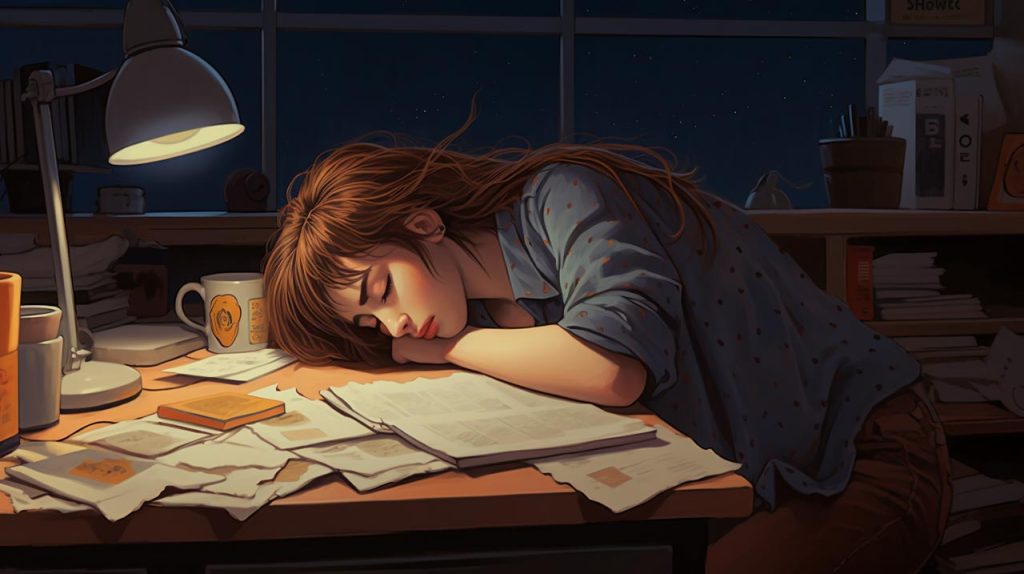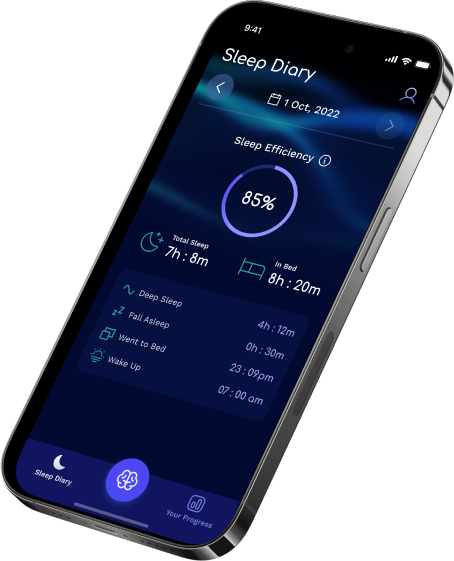
Sleep deprivation refers to not having enough sleep to feel well-rested.
A large percentage of people suffer from this problem. For instance:
- Statistics from the US and Canada tell us that 1 out of 3 people doesn’t get seven hours of sleepx.
- 62% of adults around the world report not sleeping wellx.
So, based on this data, it’s safe to say that many people you see on the street on any given day are not well-rested individuals and are not performing at their best form.
You may also be currently part of that group. Or will it be some time in the future. Because, even if only occasionally, this issue seems to come for us all eventually.
This article aims to raise awareness of the issue and provide solutions.
It’s okay to struggle with sleep deprivation occasionally; however, if we make the mistake of adapting to that state and making it part of our life permanently — i.e., chronic sleep deprivation — that’s when we start to get into serious trouble.
Let’s see why.
🔎 Feel free to jump to your preferred section in this article:
Sleep Needs by Age – Reference Table
Causes
Types
Effects on Physical and Mental Health
Diagnosis
Treatment
FAQ
Conclusion: the Well-Rested Individual
1. Sleep Needs by Age – Reference Table
Knowing how many hours someone in our age group needs to feel well-rested is good. Obviously, these needs may change according to the individual (e.g., if you exercise a lot, it’s normal to require some extra sleeping time). Still, as a general reference, the table provided by the CDCx works well.
| Age Group | Recommended Sleep Duration |
|---|---|
| Newborns (0-3 months) | 14-17 hours |
| Infants (4-12 months) | 12-16 hours (including naps) |
| Toddlers (1-2 years) | 11-14 hours (including naps) |
| Preschoolers (3-5 years) | 10-13 hours (including naps) |
| School-age children (6-12 years) | 9-12 hours |
| Teens (13-18 years) | 8-10 hours |
| Adults (18-60 years) | 7 or more hours |
| Older adults (61-64 years) | 7-9 hours |
| Seniors (65 years and older) | 7-8 hours |
2. Causes of Sleep Deprivation
The causes of sleep deprivation can vary dramatically. Let’s try to group them into five broad categories.
2.1 Poor Sleep Hygiene
How your day is structured, how your routines are established, and what activities you engage in can hurt your sleeping hours. Examples include:
- Staying up late to:
- Watch TV
- Play video games
- Scroll through Social Media
- Engage in a hobby
- Socialize
Some of these activities can occur as a form of revenge bedtime procrastination, where people stay awake past their bedtime to compensate for the time they feel is being stolen from them by their obligations during the day. This behavior happens as a way to try to regain some control.
Having poor sleep hygiene can also involve any other behaviors, habits, and environmental factors that are not conducive to good sleep, such as:
- Having no work-life balance.
- Not using technology responsibly before bed.
- Drinking coffee close to bedtime;
- Having an irregular sleep schedule.
- Having a poor diet.
- Overtraining or exercising intensely within 90 minutes of bedtime.
- Napping too much.
- Having a bedroom environment that is not conducive to sleep.
2.2 Study and Work Obligations
Work and school — these reasons might be the ones most people associate with poor sleep.
And there’s truth to that. Studies found that a substantial percentage (typically above 50%) of university students suffer from sleep deprivation and even full-on insomnia.

From those statistics, we can start getting an idea of the sleeping habits of many students. Schools can be very demanding and can affect students’ health.
And then, when students graduate and leave school, it might not get better on the sleep front.
That’s because work obligations can also be demanding due to working long hours, working in highly stressful environments, having multiple jobs, or working night shifts.
Not only can this make it challenging to find enough time to sleep, but it can also cause stress and anxiety, known to be sleep-disrupting factors.
2.3 Sleep Disorders
Sleep disorders are another major cause of sleep deprivation.
The most common examples are:
These disorders may cause difficulty falling asleep, frequent awakenings, abnormal breathing patterns, excessive daytime sleepiness, or unpleasant sensations in the legs that interfere with sleep.
2.4 Medical Conditions
Besides sleep-related medical conditions, many other health issues can also interfere with sleep in various ways (e.g., affecting the brain’s ability to regulate sleep, pain, hormonal changes, etc.) and cause sleep deprivation.
Some of these conditions are:
- Depression (even though it can also have the opposite effect)
- Schizophrenia
- Chronic pain syndrome
- Cancer
- Stroke
3. Types of Sleep Deprivation
There are two different types of sleep deprivation, which differ based on their duration and cause.
3.1 Acute Sleep Deprivation
Acute sleep deprivation happens when you enter a sleep hour debt (according to your natural number of slept hours) for a few nights.
The impact of this type of sleep deprivation on our health is typically not as serious as chronic sleep deprivation, in the sense that it likely won’t cause lasting damage, if it happens only sporadically*. Having said that, its impact on our cognitive abilities can increase the risk of accidents, and accidents can sometimes be fatal. If not for anything else, for this reason alone, you should take acute sleep deprivation seriously.
*Evidence shows this might not be that true when considering older adults, with one night of sleep deprivation being enough to accelerate their biological clock, making them age fasterx
3.2 Chronic Sleep Deprivation
Chronic sleep deprivation happens when, due to lifestyle or other health conditions, you consistently sleep less than the amount you need for optimal functioning.
Chronic sleep deprivation can impact our health (both physically and mentally) in the long term.
We will now discuss the impacts of both types of sleep deprivation below.
4. The Effects of Sleep Deprivation on Physical and Mental Health
Let’s now review the effects of sleep deprivation on health:
4.1 Acute effects
- Reduced attention, alertness, and vigilancex
- Reduced emotional processingx
- Reduced attention span, short-term memory, and reaction timex
- Brain Fog and reduced ability to perform complex cognitive tasksxy
- Increased risk of errors and accidents (e.g. while driving)x
- Poorer and Blurry Visionx
- Mood changesx
- Daytime sleepiness and fatiguex
4.2 Chronic effects
Long-term chronic sleep deprivation can increase the risks for:
- Weight gainx
- Diabetesx
- Heart diseasex
- Weakened immune systemx
- Early deathx
- Gut issuesx
- Dementia / Alzheimer’sx
- Cancerxyz
📢 Enjoying this article so far? Don’t miss the next one — you can subscribe to the newsletter, follow us on your favorite social media, or even join us for a real-time chat on Discord
5. Sleep Deprivation Diagnosis
The diagnosis of sleep deprivation can involve different techniques.
Your doctor may ask you about your sleep habits, daily activities, and other things resembling what was mentioned in the previous sections.
They will ask you for symptoms as well, naturally.
They may use tools such as a sleep diary, sleep questionnaires, or an actigraphy device (a non-invasive technique to record your sleep patterns).
📲 Pro-Tip: Using our LucidLink sleep diary app, you can easily find and connect with sleep doctors who use compatible software to collect and analyze your sleep data and provide custom-tailored treatments.
6. Treatment for Sleep Deprivation
Now comes the part you probably are interested in the most, where you learn how to overcome sleep deprivation. So, let’s discuss your treatment options.
First, talking to your doctor and receiving a diagnosis is likely the smartest move to make because this allows you to get a more personalized treatment.
Regardless, as a general rule, your treatment will most likely involve one or more of the following:
- Cognitive Behavioral Therapy for Insomnia (CBT-I): a scientifically-proven solution for insomnia. This therapy helps you break free from your current pattern of thoughts, feelings, and behaviors and develop healthier ones that will help you develop a new relationship with sleep.
- Implementation of Sleep Hygiene habits: If you suffer from sleeping problems, there’s no escaping this step, so you might as well accept it as a necessity, and develop these habits in a serious manner.
- Sleeping Pills: pharmaceutical sleeping pills are a short-term solution, because they have some risks, and don’t necessarily solve the causes of your problem. However, they might give you some necessary rest that can facilitate the implementation of other (more permanent) solutions.
Beyond these three options, you can also try these:
- Over-The-Counter Sleeping Pills and Natural Sleeping Pills: in case you haven’t seen a doctor yet – or if he hasn’t prescribed you any pills – you can still take non-prescription sleeping pills with milder effects. Read the linked pages to learn more about the benefits and downsides of these alternatives.
- Track Your Sleep with LucidLink: you can start logging your sleep every night using our Sleep Diary app. By collecting data about your sleep (but also habits), you will soon start detecting patterns, trends, and correlations. With this information, you will be able to develop an understanding of which habits correlate with better sleep — and start doing more of that — and which habits correlate with worse sleep — and start doing less of that. You will be able to make data-driven decisions about your sleep like a true sleep expert.
- Dietary changes: food can improve your sleep but can also affect it negatively. Make the appropriate changes to your diet to use it as a sleep-optimizing tool.
- Exercise: Doing cardiovascular and weight-lifting exercises (if not done within 90 minutes of bedtime) is a great way to improve your sleep and overall health.
- Relaxation Techniques: Breathing, progressive muscle relaxation, meditation, guided imagery, gentle stretches, and therapeutic tremoring can be great relaxing tools. If you’re one of those people I’ve mentioned before who feel that stress from work interferes with their ability to sleep, then these techniques can prepare the body and mind for a good night of sleep.
- 💡 Need More? Consult the Complete List: we have presented you with powerful solutions above, however you can still read our complete and extensive list of Sleep Deprivation Solutions for more ideas
Now you have a vast collection of options. It is very likely that if you try implementing them, in a serious manner, you will be able to achieve better (forget about perfect for now) sleep in the near future.
7. FAQ: Answering Some Questions
Can You Get Sick From Sleep Deprivation ❓
As mentioned above, one of the long-term effects of sleep deprivation is a compromised immune system, so the answer is yes.
Q: What Are Some Good Vitamins for Sleep Deprivation ❓
Besides the solutions suggested in our Natural Sleeping Pills article, studies have also shown that these vitamins might help with sleep deprivation: Vitamin B6xy, Vitamin Cx, and Vitamin Dx
Q: Can Sleep Deprivation Cause Depression ❓
Yes, with chronic sleep deprivation being riskier than acute sleep deprivation in that regardx.
8. Final Thoughts
Being sleep deprived sometimes is okay, if we don’t worry too much about it — after all, stressing about a negative situation can amplify its negative effects, while not worrying about it, or even finding a positive aspect in it can act as a shield against those effects.
But being chronically sleep-deprived all the time? That, my friend, is no way to live.
Think about it this way:
What about the opportunity cost? If you were not sleep-deprived all the time:
- What thoughts would you think?
- What feelings would you feel?
- What words would you say?
- What opportunities would you spot?
- What deeds would you accomplish?…
It’s time to take your sleep more seriously.
All the best,
MN
🌙 If you enjoy sleep-related content, join our community! Subscribe to our newsletter, follow us on your favorite social media, and join us for a real-time chat on Discord ☀

